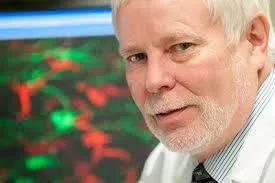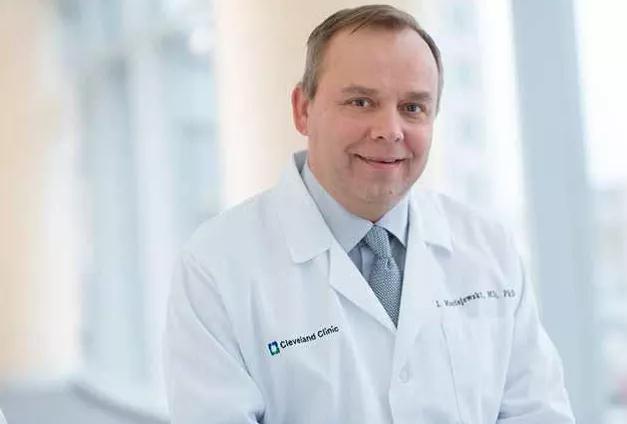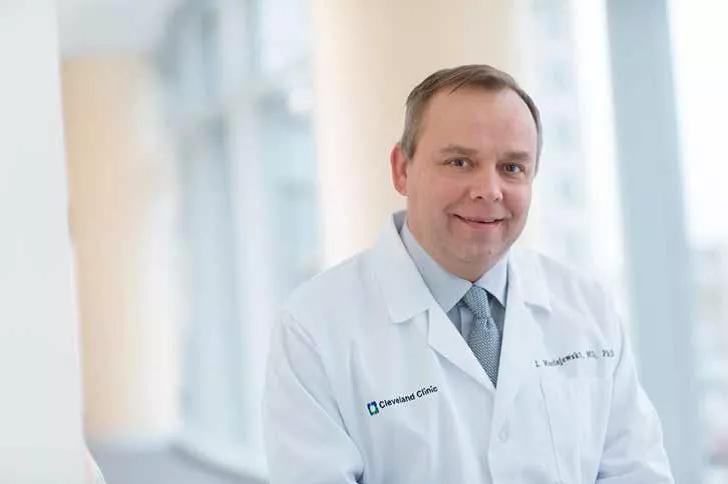Cleveland Clinic News Service | 216.444.0141
We’re available to shoot custom interviews & b-roll for media outlets upon request.
CCNS health and medical content is consumer-friendly, professional broadcast quality (available in HD), and available to media outlets each day.

Two Cleveland Clinic researchers have been awarded multi-year, multi-million dollar federal grants that support exceptional scientists with a track record of achievement.
Bruce Trapp, Ph.D., a specialist in multiple sclerosis (MS) and myelin biology, and Jaroslaw Maciejewski, M.D., Ph.D., an expert in blood and bone diseases, have each received an Outstanding Investigator Award from the National Institutes of Health (NIH).
The awards are designed to provide long-term support and flexibility to scientists whose work holds out promise for achieving medical breakthroughs, allowing them to focus on research instead of funding.
Cleveland Clinic now has three researchers named outstanding investigators since the NIH introduced the new award strategy in 2015.
Jeremy Rich, M.D., researcher in the Department of Stem Cell Biology & Regenerative Medicine at the Lerner Research Institute, was the first Cleveland Clinic researcher to receive an Outstanding Investigator Award – $6.7 million in 2015.

Image content: This image is available to view online.
View image online (https://assets.clevelandclinic.org/transform/caaadb10-7201-4359-8e09-0b5ed9a01e96/trapp-bruce_jpg)
Bruce Trapp, Ph.D.
Trapp, chair of the Department of Neurosciences at the Lerner Research Institute, becomes the first Cleveland Clinic researcher to be named an Outstanding Investigator by the National Institute of Neurological Disorders and Stroke of the NIH. He will receive nearly $7 million over the next eight years to examine the biology of MS and to seek treatments that could slow or reverse the disease.
Dr. Maciejewski, chair of the Department of Translational Hematology and Oncology Research at Cleveland Clinic, will receive more than $5.5 million over the next seven years from the National Heart, Lung and Blood Institute of the NIH. The award will support his work translating scientific advances in bone marrow failure syndromes into improved patient care.

Image content: This image is available to view online.
View image online (https://assets.clevelandclinic.org/transform/bb3af70a-20ba-4503-b8a8-eff971ba5fb5/maciejewski-jaroslaw-Copy-1_png)
Bruce Trapp, Ph.D.
Serpil C. Erzurum, M.D., chair of the Lerner Research Institute, said the grants will help high-achieving researchers find better treatments for people with complex diseases.
“These awards not only honor the remarkable work of these outstanding researchers, but will be a tremendous help in advancing discoveries that will ultimately benefit patients,” she said.
Trapp’s lab produced seminal work in the understanding of MS, a disease of the central nervous system in which the body’s immune system attacks healthy tissue. With MS, the immune system targets myelin, the protective fatty coating that wraps around nerve fibers. By destroying nerve connections, MS can lead to unpredictable fatigue, muscle weakness, difficulty with mobility and even paralysis in later stages.
In 1998, Trapp’s team revealed that the immune cells target not only the myelin sheath but also the nerve itself. That discovery caused a paradigm shift, alerting MS researchers to examine neurodegeneration—the death of nerve cells—as the cause of permanent neurological disability.
With this grant support, Trapp said he will further study how myelin loss leads to brain cell dysfunction, nerve fiber death and neurological disability, as well as how the disease process can be slowed and reversed.
Trapp, who is also a professor of Neurosciences at Case Western Reserve University, said he was honored by the award and is excited by the opportunities it presents.
“We’ve made great progress uncovering the neurodegeneration that occurs with MS. Now our challenge is to develop therapies to stop or delay the progression of the disease,” he said. “It’s a long road but this award gives us the flexibility to follow the results.”
Dr. Maciejewski, as a physician scientist and hematologist, examines the development of bone marrow failure syndromes (BMFS) and their molecular genetics. His research indicates BMFS will likely not be cured by a universal drug, owing to its molecular diversity. Rather, the disease demands multiple therapies personalized for each patient and guided by biomarkers.
He hopes to use the award to address biologically important abnormalities found in a significant proportion of patients, while furthering the understanding of these abnormalities to enable the development of new classes of drugs, and new approaches to applying them and existing options.
“The translation of scientific advances into improved patient care and cures has been the primary goal of my team’s work,” he said. “This award supports our belief that now is the time to advance translational findings to make progress in medical care, including diagnostics and therapeutics for BMFS.”

Image content: This image is available to view online.
View image online (https://assets.clevelandclinic.org/transform/8ed49f88-ec52-46d3-9ea3-f07f274983cb/maciejewski-jaroslaw-Copy_png)
Jaroslaw Maciejewski, M.D., Ph.D.

Image content: This image is available to view online.
View image online (https://assets.clevelandclinic.org/transform/caaadb10-7201-4359-8e09-0b5ed9a01e96/trapp-bruce_jpg)
Bruce Trapp, Ph.D.
Cleveland Clinic is a nonprofit multispecialty academic medical center that integrates clinical and hospital care with research and education. Located in Cleveland, Ohio, it was founded in 1921 by four renowned physicians with a vision of providing outstanding patient care based upon the principles of cooperation, compassion and innovation. Cleveland Clinic has pioneered many medical breakthroughs, including coronary artery bypass surgery and the first face transplant in the United States. Cleveland Clinic is consistently recognized in the U.S. and throughout the world for its expertise and care. Among Cleveland Clinic’s 82,600 employees worldwide are more than 5,786 salaried physicians and researchers, and 20,700 registered nurses and advanced practice providers, representing 140 medical specialties and subspecialties. Cleveland Clinic is a 6,728-bed health system that includes a 173-acre main campus near downtown Cleveland, 23 hospitals, 280 outpatient facilities, including locations in northeast Ohio; Florida; Las Vegas, Nevada; Toronto, Canada; Abu Dhabi, UAE; and London, England. In 2024, there were 15.7 million outpatient encounters, 333,000 hospital admissions and observations, and 320,000 surgeries and procedures throughout Cleveland Clinic’s health system. Patients came for treatment from every state and 112 countries. Visit us at clevelandclinic.org. Follow us at x.com/CleClinicNews. News and resources are available at newsroom.clevelandclinic.org.
Editor’s Note: Cleveland Clinic News Service is available to provide broadcast-quality interviews and B-roll upon request.